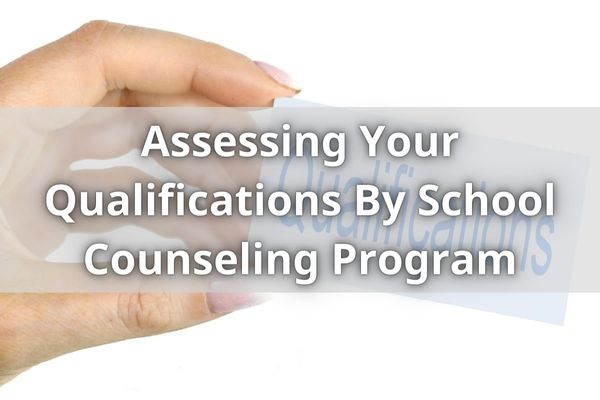How Do I Become A School Counselor? Licensure & Requirement
How Do I Become A School Counselor? The vocation of a school counselor is one that offers excitement and fulfillment. It may be a fantastic method to improve the lives of young people, but it takes commitment and expertise in the subject.
I’ll outline the procedures you must follow in this post if you wish to work as a school counselor. From educational requirements to licenses and certifications, I’ll cover everything you need to know about becoming a qualified professional in this important role.
Assessing Your Qualifications By School Counseling Program

I have always been passionate about helping people, and I am considering a career as a school counselor. The first step in becoming one is assessing my qualifications.
To become a school counselor, I need to pass and obtain at least a master’s in school counseling with relevant to school counseling coursework and practicum experience. Additionally, certification is usually required by the state where I will be employed; this certification requirement to become a school counselor may vary depending on location.
From there, I would need an undergraduate degree in psychology or related field before applying for a graduate program that offers me the training necessary to pursue licensure as a school counselor.
It is also important to know what type of student population I want to work with – primary or secondary level students? If I choose elementary students, does my university offer courses specifically tailored to their age group? These are all questions worth researching when looking into potential school counseling programs so that the best fit is found for me.
In order to move forward in this process, obtaining the required credentials from an accredited institution is key. Researching available options can help ensure that my education and subsequent licensing meet the standards of practice set forth by my local regulatory body.
Obtaining The Required Credentials
Becoming a school counselor is an exciting and rewarding career path. It takes dedication, determination and the right credentials to make it happen!
You must meet specific qualification standards in order to be eligible to work as a school counselor. These include earning a counseling degree, doing an internship, earning a master’s degree, and satisfying any state certification or licensure requirements.
Having an education provides the foundation for successful counseling. A bachelor’s degree in psychology, sociology or social worker can be useful when applying for entry-level positions but most employers prefer applicants with at least a master’s in counseling from an accredited university program. This includes courses such as human growth and development, multicultural issues in mental health counseling and theories of personality.
School counselors may also want to obtain specialized certifications that are specific to working with children or adolescents if you plan on specializing in those areas later on.
It’s important to remember that while having the proper educational qualifications can open doors for you professionally, gaining practical experience through internships and volunteer opportunities can give you invaluable insight into the field of school counseling. Many schools have their own internships which provide supervised clinical practice so try searching online for programs that might interest you.
With this combination of academic knowledge plus real world experience under your belt, you’ll be well prepared to move onto deciding on your specialization within school counseling!
Deciding On A Specialization
Having obtained all the required credentials, one can now progress to deciding on a specialization as a school counselor.
It is important to understand that while every school counselor job description may be slightly different, they will share certain commonalities in their roles. Generally speaking, all school counselors are expected to possess and demonstrate strong interpersonal skills and an understanding of human development principles; this includes being able to properly assess the needs of students and provide them with resources for further assistance when necessary.
To become a certified school counselor, it is essential to have completed applicable academic requirements such as earning a Masters degree in counseling or psychology-related fields from an accredited institution. Additionally, you must also fulfill any state-specific counselor requirements which could include passing licensure exams or completing supervised internship experience.
Taking into account these qualifications should give one an idea of what type of school counseling certification best suits your practice goals:
- Mental Health Counseling – In this instance, the focus would be on using various therapeutic techniques to help treat mental health issues among children within a school setting.
- School Guidance Counseling – This role entails developing intervention programs tailored towards helping individuals grow academically and socially through career exploration, problem solving strategies and more.
- Substance Abuse Counseling – The goal here would be providing guidance and support towards prevention measures related to substance abuse amongst young people in schools.
By carefully considering each area’s individual merits and drawbacks together with your own skill set and interests, one can decide upon the most suitable potential path needed to become a school counselor.
Now we move onto exploring working in a school setting…
Working In A School Setting
The easy answer to the question of how to become a school counselor is to work in a school environment. You can learn about the responsibilities of counselors by working in this setting and gaining experience with kids in pre-kindergarten through grade 12. Additionally, if at all feasible, you should undergo a supervised internship. This will give you a better understanding of what it takes to be successful in this industry.
High schools are particularly great places for aspiring school counselors because they allow individuals to observe their peers and other teachers’ interactions with each other. This helps build familiarity with regulations, policies, procedures and expectations while providing an opportunity to practice counseling skills on smaller scale issues that may arise throughout the day.
Additionally, many states require educators or those interested in becoming certified school counselors to have some type of teaching experience before enrolling in graduate programs.
From developing relationships with administration staff and faculty members to gaining hands-on experience interacting with students of various ages, there are plenty of benefits associated with working in a school setting prior to pursuing certification as a school counselor.
With the right amount of dedication and hard work, anyone looking to enter this profession can find success by taking these steps first. Onward we go towards developing essential skills needed for this rewarding career path!
Developing Essential Skills

I’ve always been passionate about working with children, so becoming a school counselor made perfect sense. It’s an incredibly rewarding profession that allows me to help shape the lives of young people and make sure they have access to resources and guidance when they need it most.
To become a school counselor, there are certain steps to becoming a school counselor I must take in order to pass state requirements for this career path. One key step is understanding the different roles of a school counselor. Knowing how to assist and direct kids in a range of education systems, from elementary and secondary schools to high schools, is crucial.
Additionally, school counselors maintain tight relationships with parents, educators, administrators, and other parties involved in a child’s education. Along with providing academic advice and social-emotional counseling services, it’s essential for me to stay informed on current trends and research within my field as well as any changes or updates in policy or procedure at the local level.
In addition to gaining knowledge related to the role of a school counselor, I will also need to develop the necessary skills required for success in this profession. This includes
- Being able to effectively communicate with individuals from diverse backgrounds while maintaining confidentiality
- Having strong problem-solving abilities
- Possessing sound judgment
- Demonstrating excellent organizational skills
- Exhibiting empathy
- Incorporating technology into daily tasks
With these qualities under my belt, I’m ready to begin taking the next steps on my journey to becoming a school counselor successfully.
Having identified some of the core components needed for this career path—understanding the role of a school counselor as well as developing essential skills—the next step is understanding what goes into this job on both personal and professional levels.
Understanding The Role Of A School Counselor
I’m sure many of you may be wondering what it takes to become a school counselor. Becoming a school counselor is an important endeavor and requires dedication, knowledge, and skills. School counseling involves helping students navigate the academic, personal/social, and career development components that make up their educational experience.
An understanding of the role of a school counselor can help those interested in this profession decide if they have the qualities necessary to succeed as one. Aspiring school counselors must first need to complete coursework related to areas such as psychology, guidance and counseling techniques, learning theories, child growth and development, multiculturalism in education, classroom management practices among others topics.
With this foundation in place, prospective counselors then need to gain practical on-the-job training by observing experienced professionals or completing internships with schools or organizations that serve children. Counselors play a critical role in preparing students for success both inside and outside of the classroom.
School counselors provide support to students from pre-kindergarten through grade 12 across multiple domains – academics, social/emotional well being, college preparation and more – so having a diverse set of professional competencies is essential for successful performance within this field. By understanding how school counselors work together with other staff members at educational institutions to ensure student success; individuals who want to pursue this path can determine whether they possess the right characteristics for this particular job before embarking on the journey.
Having an understanding of the various roles required when becoming a school counselor helps aspiring candidates better prepare themselves for developing an effective counseling style.
Developing A Counseling Style
I am sure you have heard the phrase that it takes a village to raise a child, and this is especially true in our schools. School counselors play an important role in helping students succeed by providing emotional support and guidance within school communities.
To become a school counselor, there are certain steps one must take to develop the necessary skillset for success. The first step towards becoming a successful school counselor begins with completing a counseling program at an accredited university or college offering courses related to the field of psychology and human development.
These programs typically cover topics such as group dynamics, ethics, psychological assessment, crisis intervention and educational theories. After graduating from your chosen counseling program, most states require individuals to complete further licensure examinations before they can practice independently as professional school counselors.
In addition to having knowledge of various counseling strategies, school counselors also possess strong interpersonal communication abilities so they can effectively assist students when needed. They need to be able to foster relationships with parents/guardians while being accessible to all staff members within their respective schools.
It is essential for them to understand how learning environments work in order to create effective solutions for any issue that may arise throughout the school year. Once these qualities are successfully developed over time through experience and self-reflection, aspiring school counselors will be well on their way toward becoming successful professionals who provide and gain valuable skills and advice within their communities.
With the right attitude and resources available, working with students and families becomes much easier than it initially appears!
Working With Students And Families
I’m passionate about becoming a school counselor and helping students, families, and communities. To do this job well I need to understand the different roles of K-12 counselors as well as possess certain qualifications including a Master’s Degree in School Counseling. Being aware of what the school counselor salary information looks like is also important while considering this type of career path.
My educational background includes sociology which will be useful when working with students and their families. It is my responsibility to make sure that each student has access to counseling indirect services to students if needed and I must know the difference between guidance vs counseling so that I can ensure every person gets the help they require.
In order for me to be successful in this position, I must also be able to talk on a variety of subjects like mental health, substance misuse, bullying, violence prevention, college preparation, etc.
The most fulfilling aspect of my employment would be observing my customers’ personal development as accomplished people who are prepared for life beyond high school or college. As such it is essential for me to establish trusting relationships where I’ll be able to provide support during difficult times and offer guidance towards positive outcomes.
Establishing Professional Relationships

I had to conduct some study since I wanted to work as a school counselor. Priority one should be given to getting the right education. Most of the state’s requirements that counselors have at least a master’s degree in counseling or a related field. Before they are permitted to practice, counselors must also get a license from their state’s government. It is generally advised that persons pursuing licensing attend continuing education classes as well; doing so will enable them to pick up important abilities that will help them succeed at work.
Additionally, there are certain expectations placed upon professionals in this field. School counselors are required to follow by the moral standards established by specialized associations like the American School Counselor Association (ASCA). They should value inclusion and diversity while working to make all kids’ learning environments secure. Furthermore, these professionals should advocate for student success through collaboration with faculty members, administrators, parents and guardians.
Understanding cultural backgrounds of students and providing appropriate interventions is essential when working with young people of varying ages and abilities. A good school counselor will strive to build meaningful relationships with each individual student within their caseload while recognizing any special needs that may exist.
To ensure success in meeting these objectives, effective communication between stakeholders is key. Moving forward from here, understanding the regulatory requirements associated with becoming a school counselor provides an important foundation for pursuing this career path further.
Understanding The Regulatory Counselor Requirements
Becoming a school counselor is an exciting, yet challenging journey. It requires dedication and hard work to understand the regulatory requirements for each state. To start, you will need to earn your bachelor’s degree from an accredited university in counseling or psychology; then pursue a master’s program that meets the state-by-state standards for licensure.
Here are five key points to remember when it comes to understanding the regulatory requirements:
- You must have an undergraduate degree from an accredited institution relevant to your career field such as counseling or psychology
- Be sure your master’s program fulfills any prerequisites needed for licensing in the particular US state where you plan on practicing
- Licensing eligibility may vary between states, so be sure to research the specific regulations of each one
- Most states require completion of both a bachelor’s and master’s degree before applying for positions
- Some states also require additional testing and/or supervised practical experience prior to obtaining certification
It can usually take four years to complete study and practice before meeting all qualifications necessary for licensure. After becoming familiar with these rules and regulations, you can begin preparing yourself by looking into what is required to apply for school counselor positions in different states.
Applying For School Counseling Positions

A job as a school counselor may be tremendously satisfying. It entails assisting kids with their social and mental health issues and offering counseling to help them achieve in life.
It’s critical to comprehend what a school counselor does and the requirements for entering this sector before applying for any employment.
The requirements for becoming a school counselor vary by state or jurisdiction. Generally, most states require applicants to have at least a master’s degree in school counseling from an accredited university program before they are able to become certified.
Many programs also include clinical experience working directly with children, adolescents, and adults in order to gain practical knowledge of how best to provide services within a school setting. In addition, some states may also require additional coursework related to include education requirements theory and ethics.
The career outlook for those who pursue a master’s degree in school counseling is very positive. Advances in technology have made it easier than ever for counselors to assist more students without having to travel long distances. With increased demand due to rising student populations and specialized needs of students today, there are many opportunities available for counselors who possess the right skillset and training.
Conclusion: How Do I Become A School Counselor?
Becoming a school counselor can be an incredibly rewarding career. Not only will you make a difference in the lives of students, but you’ll also have the opportunity to earn a relatively decent salary. It’s important to remember that while experience is necessary for gaining employment as a school counselor, there are many resources available designed to help individuals pursue this profession.
Through online courses, mentorships, and more, it is possible to learn all the skills needed to become qualified and successful in this field. With dedication and hard work, anyone can achieve their dream of becoming a school counselor!







